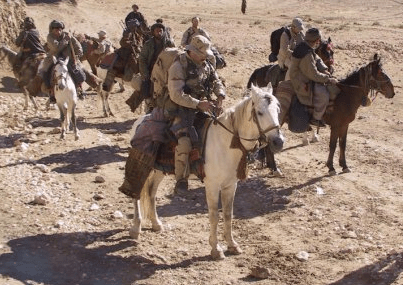
Building relationships and rapport is an extremely important step towards working with a a component of a resistance movement – whether it is a guerrilla force, part of the underground, or a the support network. It is also extremely important during counterinsurgency (COIN), Foreign Internal Defense (FID), and other types of advisory and training missions that involves working with paramilitary forces or the military of other countries.
Among the most essential components of such missions is relationship-building, the working with local allies to overthrow corrupt regimes like the Taliban. It involves embedding in local militia units, sharing their accommodations, eating at their communal meals. It involves drinking tea, taking horse rides along steep mountain trails. It’s sharing their hardships, bathing in icy rivers, and sleeping in a cave or under a truck in the mountains in freezing November weather.
“I find the best way to start out is, even if you don’t know a language fluently, showing an effort that you want to learn the language,” said Chief Warrant Officer 2 Brad Fowers, a Special Forces Soldier who served on one of the first Special Forces teams to go into Afghanistan in 2001. “Picking up on cultural nuances, you know, the placing of a hand on the chest, head gestures, picking up on all of these things and kind of giving that back when you communicate with a partner force just shows a lot of respect.”
Building trust, whether it’s by showing local fighters they can rely on America, that there will be bombs, ammunition and humanitarian supplies to support them, he said, “is everything. I think that was really highlighted in Afghanistan. … You have a handful of Americans there. At any time, that town can fold on you. You only have so much ammunition. You’re just as reliant on them as they are on you.”
U.S. Army Special Forces Green Berets learn how to work with indigenous forces during the Special Forces Qualification Course (SFQC) and are put to the test during an Unconventional Warfare exercise called Robin Sage. A huge part of the SF Soldiers ability to establish rapport and a long-term beneficial relationship is the ability to converse in the counterpart’s language. Green Berets go through extensive Special Forces language training before they are assigned to a Special Forces operational detachment.
Read the rest of the article about building relationships with local proxy forces – “A Green Beret reflects on necessity of strong relationships with local allies” – by Elizabeth M. Collins, Defense Media Activity, Army.mil, November 17, 2016.